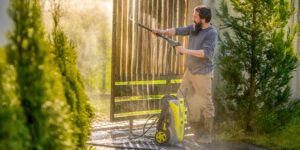Pressure Washing 101
Pressure washing is a cleaning process where high-pressure water is sprayed to remove dirt, loose paint, grime, and dust from a variety of surfaces. It can also be used to clean concrete surfaces. Among its many benefits, pressure washing is ideal for removing stubborn stains and odors.

Power washing is a method that combines high pressure and temperature to clean a variety of surfaces. It can also remove tough stains, such as mold and mildew. This method can also be used to remove chewing gum and grease. It is generally recommended for heavy commercial cleaning jobs. Visit Website to learn more.
Power washing is a relatively inexpensive way to clean many surfaces. It is also safe for most surfaces. It can be used on both indoor and outdoor surfaces. However, some homeowners are unsure which method is right for them. If you have a hard-to-reach area, power washing may be the best way to go.
When using power washing, you should be aware of the risks associated with high-pressure water. It is possible to injure yourself, especially if you are cleaning delicate materials. Because it uses high-pressure water, it can be a good option for cleaning your deck, front door, siding, and other areas. The main difference between power washing and pressure washing is the level of cleaning power. With pressure washing, you can use cleaners or detergents that can help remove tough dirt and grime.
Power washing is a good option for homes with deep-seated black mold or other types of stubborn stains. While the power washing method can be more effective at removing dirt and grime, pressure washing is best suited for smaller projects. However, before choosing a method, it is essential to check the surface recommendations.
Both pressure washing and power washing have their advantages and disadvantages. Pressure washing is safer, but power washing is more versatile. It allows the homeowner to customize the PSI settings according to the type of surface. Both methods are effective at cleaning most surfaces without causing damage. Using different nozzles is what makes power washing so popular. For instance, a 0-degree nozzle shoots water directly at a surface, while a 25-degree nozzle increases surface area.
When using power washing, you must be aware of the risks involved. A power washing can cause damage to the paint, roof shingles, and brick. The water can also splatter or even shatter windows. You should avoid using ladders when power washing. If you do not know how to use the machine properly, you could cause serious injury.
Pressure washers are powerful and dangerous, but using them correctly can minimize injuries and damage to your property. To help prevent injury, use these safety precautions when pressure washing your property: You must always keep the pressure washer nozzle at least two feet away from the person or surface it’s cleaning. The jets can spiral out and cause damage to objects nearby. Also, you should never aim the wand at a person or pet. Never aim the wand upwards or at a window. Pressure washers are incredibly loud, and constant exposure to the sound can be damaging to your hearing. Wearing earmuffs is a good way to protect your hearing from high decibels.
Always wear protective gear when using a pressure washer. Even small wounds can be very serious. Even if they are not deep, water and air can become trapped underneath the skin. If you experience an injury, seek medical attention immediately. Read the instructions that come with your pressure washer to ensure you’re using it properly. Lastly, keep the pressure washer outdoors and never use it inside a home or business.
Wear layers of clothing and safety goggles. It’s especially important to wear protective gear while pressure washing your home because debris and water can shoot back at you. You should also wear a full face mask or protective gear if you’re working on a roof, as debris and water can shoot out from above.
Pressure washing can be dangerous because the high-pressure streams can cause serious injuries if they are misdirected. Common injuries include bruises, lacerations, and even eye injuries. Also, pressure washer fluid can be forced into the surrounding tissues, which can cause serious bacterial infections. The most severe injuries, however, are those that cause damage to nerves.
